Clash of Titans
Games featuring a future Hall of Fame coach on each sideline.
December 8, 1928: Florida @ Tennessee
Charlie Bachman vs Robert Neyland
"We were a bit lucky to beat Florida."
Chicago native Charlie Bachman played for Notre Dame from 1914-16 and the Great Lakes Navy team in 1918 during World War I. Along the way, he played guard, center, and fullback.
He started his coaching career at age 27 at Northwestern for one year before moving to Kansas State for eight years, compiling a record of 33-23-9. He was credited with making many improvements in football pants and protection pads.
Florida was looking for a new coach for the 1928 season to succeed Harold Sebring, who played for Bachman at Kansas State in 1921 and 1922. Sebring attended the Florida Law School while coaching as an assistant and then head coach. His graduation from law school marked the end of his coaching career and opened the door for his football mentor, Bachman.
When the coaching position came open, Florida Athletic Director Everett Yon started his search by calling Knute Rockne at Notre Dame. Rockne recommended Bachman for the job and then called Charlie and told him so.
Bachman has been described as "a strong-willed disciplinarian of German extraction" who believed in "exercises and all manner of off-season programs."

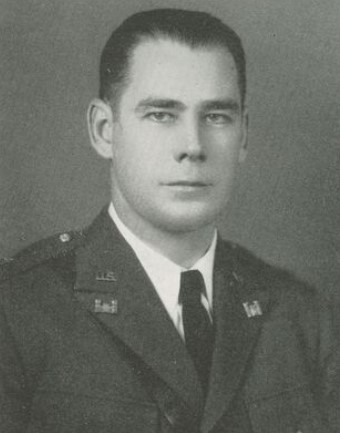
L: Charlie Bachman (University of Florida Tower/Seminole Yearbook - Class of 1928)
Robert Neyland (University of Tennessee Knoxville - Volunteer Yearbook - Class of 1929)
Bachman called it "an interesting coincidence" because he was debating resigning from Kansas State. His wife had asthma and needed to leave the Kansas climate. The Florida athletic committee offered Charlie $7,000 a year, the same salary he was making at Kansas State.
Sebring's 1927 Florida team went 7-3 and almost the entire squad was returning. So Bachman would not need several years to rebuild the program. "I brought in no one," said Bachman. "They were all there when I arrived."
Florida shut out the first three opponents in 1928: Florida Southern (26-0), Auburn (27-0), and Mercer (73-0). North Carolina State provided the first real test but fell 14-7 to the Gators, who were on their way to leading the nation in scoring.
Sewanee had been a Southern powerhouse at the turn of the century, but that was old news by 1928 when the Gators swamped them 71-6. Archrival Georgia fell 26-6 as did Clemson, 27-6. Florida moved to 8-0 by clobbering Washington & Lee 60-6.
Meanwhile, another Southern Conference team, Tennessee in Robert Neyland's third season as coach, was also forging an undefeated season. It started during spring training when Neyland was impressed with the group of players who would be sophomores in the fall.
with victories over conference members Ole Miss (13-12), Alabama (15-13), Washington & Lee (26-7), Sewanee (37-0), and Vanderbilt (6-0). Finally, on November 29, a week before the finale with Florida, the Vols could do no better than a scoreless tie against Kentucky.
That set the stage for the battle of unbeatens in Knoxville with the winner claiming the Southern Conference championship. Florida was favored because of the Vols' tie. Interestingly, Bachman and Neyland were on opposite sides when Notre Dame played Army during their playing careers.
The Gators' chance of victory was harmed when both starting tackles were left in Gainesville. Jus Clemons had "a lung infection," and Joe Bryan got into an argument with line coach Joe Bedenk and got off the train before it left the station.
Frigid Weather in Knoxville
When the Gators' train pulled into Knoxville, it was bitter cold. Still water turned to ice almost immediately. The high on game day was 35°. To make the situation worse for the Floridians, the field was slushy, which would slow down their fleet backs who depended on good footing for their speed. Bachman had mud cleats for his backs but none for his linemen.
A rumor spread that Bachman received a telegram saying Florida would be considered for the Rose Bowl if they beat Tennessee.
Coach Neyland spent the week in the hospital with the flu and missed all the practices. However, he wasn't about to miss the game. He arrived at the stadium in a wheelchair and coached from it on the sideline. However, at game's end, he arose from his seat as if healed.
However, the absence of the head coach who was a fanatic for preparation, practice, and execution would remove an edge that the Vols enjoyed against almost every opponent.
Dodd Calls His Own Plays
That opened the door for sophomore QB Bobby Dodd, thinking like the Hall of Fame coach he would become at Georgia Tech, to implement an idea of his own. Dodd told his high school teammate, E Paul Hug, that he would run a play they learned at Kingsport High School. Dodd would call a sweep to the left. But when he took the snap, he would fake a handoff to the tailback, hide the ball on his hip, roll around right end, and throw the ball to Hug who would be wide open.
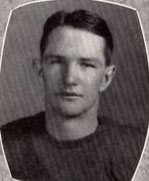
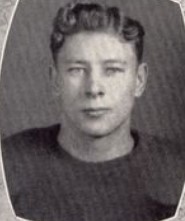
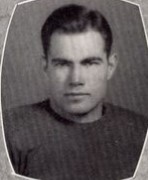
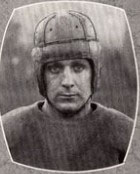
L-R: Bobby Dodd, Buddy Hackman, Gene McEver, xxx Horner
(University of Tennessee Knoxville - Volunteer Yearbook - Class of 1929)
Dodd started hot, completing seven of his first eight passes. Tennessee took the opening kickoff and drove to a first down on Florida's 20, using not only the Kingsport play but others that the confident quarterback made up in the huddle. But on third and four, Frank Clark intercepted Dodd's pass on the 20 to end the threat.
When the Vols got the ball back, they marched to the Florida 13 before what today would be called an ineligible receiver downfield penalty cost them possession of the ball.
On the Tennessee sideline, Neyland told the man sitting next to him that he'd never seen any of the plays Dodd called.
"I made up some plays," Dodd admitted. "I played well enough. Neyland couldn't get me outta there. He didn't particularly like me 'cause, remember, I was going to take Hug and go to Vanderbilt."
Vols Finally Score
The second quarter began with UT on Florida's 40 and Gator fans throwing oranges to other fans in the stands. The Vols drove from there to a touchdown. The longest gain was a Dodd pass to his buddy Hug for 20y to the one. It took three snaps, but McEver went over left guard for the touchdown. Instead of place-kicking the extra point, Dodd lined up in a fake drop kick formation and passed into the end zone to E "Herc" Alley. Tennessee 7 Florida 0
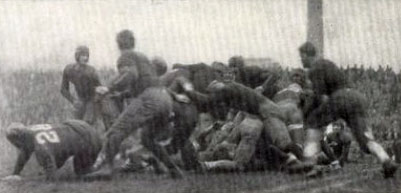
Buddy Hackman plunges to the one to set up Tennessee's first touchdown.
(University of Tennessee Knoxville - Volunteer Yearbook - Class of 1929)
Years later, Neyland told an Associated Press reporter that Dodd "would run them [plays he made up], and the first chance he'd look toward the Tennessee bench and laugh. We never knew exactly what to expect when Dodd was calling signals."
Florida's first string backfield reentered the game and started a rally. Facing third ddown and ten, Carl Brumbaugh passed to Royce Goodbread for 31y to the Vol 40. Two plays later, Brumbaugh threw to Dale Van Sickel for 13y to the 27. But James Finney's interception ended the threat.
The Vols drove to the Gator 28, but Rainey Cawthon's interception of Dodd's pass stopped the march.
Halftime score: Tennessee 7 Florida 0
Gators Tie Score
The nation's top-scoring offense finally got untracked. Powered by the running of Goodbread and Brumbaugh and Clyde "Cannonball" Crabtree's pass to Van Sickle to the 6" line, Florida scored on Goodbread's plunge. The Gators lined up in kick formation, but instead Crabtree tried to pass to Cawthon that was knocked down. Tennessee 7 Florida 6
Florida's momentum continued when the defense forced a punt. But Dodd fumbled the snap, picked up the ball, and passed to Hackman, who was stopped short of the first down marker to give the Gators the ball on the Vol 43. But three plays later, Dodd intercepted a Crabtree pass.
The play of the game occurred on the first snap of the fourth quarter. Florida had a first down on its 28. Crabtree took the snap and ran out and tried to lateral to Brumbaugh, who was in the open with plenty of room ahead of him. But Dave McArthur hit Crabtree's arm at the moment of release, and the ball flew up and short into the arms of Hackman who took it on the dead run 28y into the end zone. Dodd's drop kick was blocked to keep the score at 13-6 Tennessee.
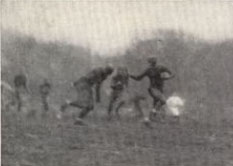
Buddy Hackman runs 35y with intercepted lateral for touchdown.
(University of Tennessee Knoxville - Volunteer Yearbook - Class of 1929)
Undaunted, the Gators drove 70y to the two. The big gainers were Cawthon's 22y run to midfield, and a 17y pass from Brumbaugh to Crabtree to the Vol 32. On fourth down and two, another Brumbaugh-Crabtree connection moved the sticks to the 21.
The relentless drive continued. Cawthon for six up the middle and Brumbaugh to Crabtree for a first down on the ten. Cawthon for another six to the four. Then Cawthon hit a stone wall at right guard before Goodbread gained just a yard. Fourth down and two. Cawthon is stopped inches short of the first down to turn the ball over on the 1' line.
Dodd immediately punted only to the 28. On second down, Brumbaugh passed to xxx Owens for 27y to put the pigskin a foot short of the goal line. This time the beleaguered Vol defense couldn't hold as Owens went over for the touchdown.
Kick the point and Florida has come all the way back to tie the score. But Brumbaugh's place kick was blocked. Tennessee 13 Florida 12 TIME?
The next time Florida got the ball, they drove to the Vol 45 where they faced fourth and nine. xxx Bowyer lined up to punt but instead passed to Brumbaugh, who apparently wasn't aware that he was the target. The ball hit him in the back and fell incomplete.
A puzzling decision soon gave the Gators good field position. McEver's 12y run gave the Vols a first down at Florida's 45. Three more runs made it fourth and two at the 37. Instead of punting, the Vols went for it, but xxx Horner missed the first down by inches.
With time ticking away, Florida made one first down before two penalties for incomplete passes moved them back and sealed the victory for the Vols.
FINAL SCORE: TENNESSEE 13 FLORIDA 12
Postgame
The loss would haunt Florida football for decades. Crabtree recalled, "I felt awful at the time, but I feel worse every year that passes. I never knew it would mean so much to us all."
Crabtree verified that Bachman had received the message from the Rose Bowl. "I remember he waved the wire at us and said it was from the Rose Bowl and that we would be considered."
"I remember, too," said McEwen. "We were lying on a hillside at a country club where we were staying, having a team meeting and he told us. Yes, I know he told us."
Asked decades later about his Rose Bowl contact, Bachman said, "Well, maybe I mentioned something. I don't remember. I knew Tech had the bid. That was for certain. Maybe I thought if we won, they'd reconsider, and I said that. I can't remember."
Georgia Tech finished the season 9-0 and went to the Rose Bowl where they defeated California 8-7 in a game remembered for Cal's All-American C Roy Riegels scooping up a Tech fumble and running in the wrong direction toward his own goal line.
Another rumor claimed that Tennessee wet the field all day before the game so the playing surface would freeze overnight, then thaw, and turn to mud to slow the Gator backs.
Bachman disagreed. "I don't think they'd do that. I think it was natural from previous snow and rain and the cold."
Asked if Neyland was really ill, Bachman said, "I don't know. He was in that wheelchair. Neither his being in the wheelchair nor the wet ground caused us to miss the two points or not to complete the lateral to Brumbaugh. I can see it now. I have seen it for nearly half a century."
When he was Georgia Tech coach, Bobby Dodd was asked about the 1928 Florida contest. "I remember that game. How I remember it. When it began, I thought our Tennessee team could beat anybody anywhere. When it was over, I confess, we were a bit lucky to beat Florida."
References
The Gators: A Story of Florida Football, Tom McEwen (1974)
Dodd’s Luck: The Life and Legend of a Hall of Fame Quarterback and Coach, Robert Lee “Bobby” Dodd and Jack Wilkinson (1987)
The Gators: A Story of Florida Football, Tom McEwen (1974)
Dodd’s Luck: The Life and Legend of a Hall of Fame Quarterback and Coach, Robert Lee “Bobby” Dodd and Jack Wilkinson (1987)